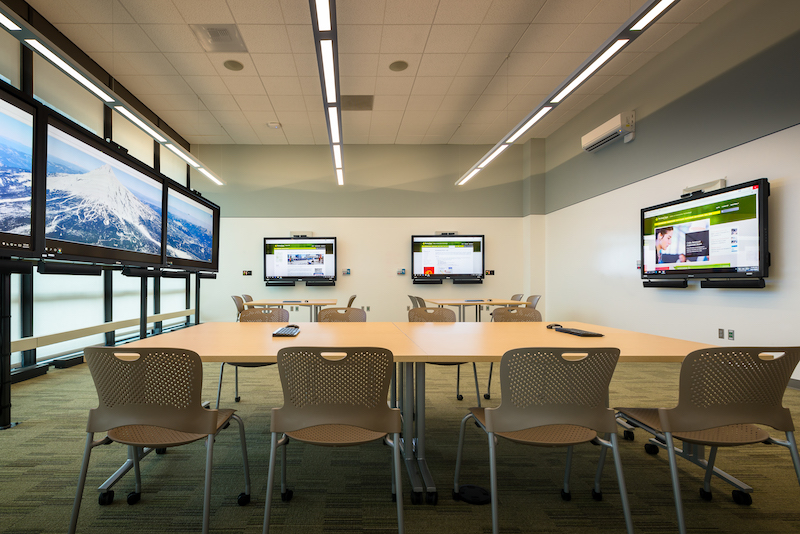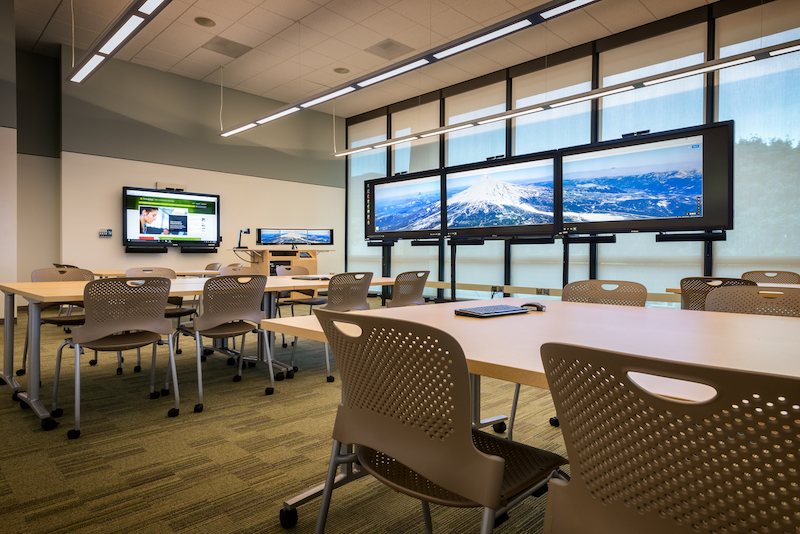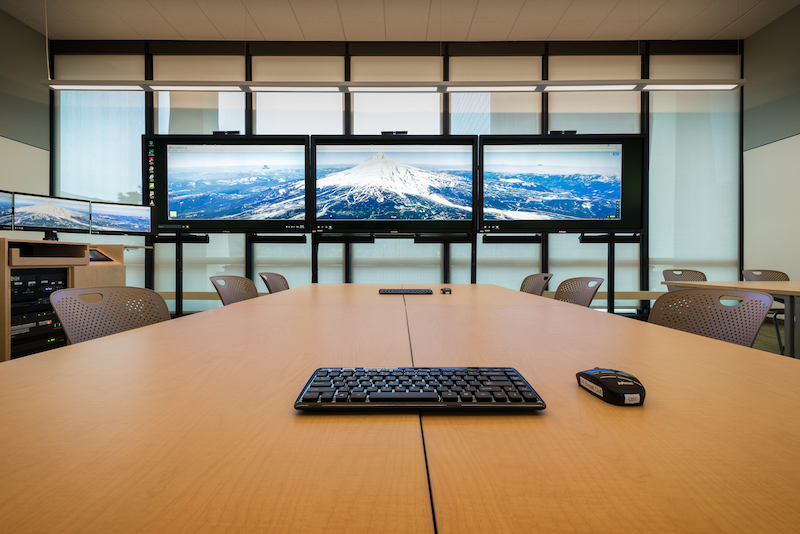Portland State University wanted to create a high-tech collaboration space for its students, researchers, and community stakeholders to come together. The space would be used to work on a variety of projects that link data sets, visualization, and decisions.
In order for the room to achieve its main purpose, it needed to have large visuals, powerful computing, robust video conferencing and a modular environment. The new space, dubbed the Decision Theater, originally was going to have a multi-panel video wall installed, but the concern was that the video wall would be great for large groups, but wouldn’t be conducive to individuals or small groups working separately in the room.
Eventually, PSU decided to use InFocus Mondopads to create the video wall because they can be used together to display one large image, but can also be used separately for smaller groups without losing any of their desired functions.
InFocus Mondopads, which are essentially large tablets, include features such as a touchscreen interface, camera, speaker bar, extensive connectivity, and the ability to be integrated into existing AV systems.
 Photo courtesy Portland State University.
Photo courtesy Portland State University.
In total, PSU used seven Mondopads in the Decision Theater. Three 1080p 80-inch Mondopads are tiled across the front of the room with the ability to display multiple smaller images or one giant image. Another four 1080p 70-inch Mondopads were placed on the remaining three walls to create group huddle spaces. The three 80-inch Mondopads at the front of the classroom can also be broken apart to create seven separate all-in-one displays.
Each Mondopad has a multi-touch high definition display and comes with a built-in Windows PC and a full version of Microsoft Office. The large screen can also become a digital interactive whiteboard, has document annotation, and allows users to share, view, and control the screen from a tablet or smartphone.
Business-class video conferencing allows PSU students and researchers to connect with individuals across the country. While on a video call, the work being presented, such as design plans, can be drawn on top of and annotated.
The full Mondopad product line stretches from 57-inch screens up to 85-inch screens.
 Photo courtesy Portland State University.
Photo courtesy Portland State University.
Related Stories
| Aug 11, 2010
Earthquake engineering keeps airport grounded
Istanbul, Turkey's new 2.15 million-sf Sabiha Gökçen International Airport opened on October 31, 2009, becoming the world's largest seismically isolated building. Arup's global airport planning and engineering team, in collaboration with architects Dogan Tekeli Sami Sisa Mimarlik Ofisi and contractor LIMAK-GMR JV, working within an 18-month timeline, designed and built the facility wi...
| Aug 11, 2010
New Ways to Improve Water Efficiency
In the U.S. and most of the industrialized world, building occupants take for granted the simple convenience of filling a glass with clean, drinkable water at the kitchen sink. Yet worldwide, nearly a billion people globally have no access to safe drinking water, according to the Natural Resources Defense Council.
| Aug 11, 2010
Healthcare construction weathers the recession
Healthcare construction spending grew at a compound rate of more than 10% for seven years through mid-2008, but has stalled since then. The stall, however, still represents better growth than almost any other construction market during the recession, which deepened as a result of the fall 2008 credit freeze.
| Aug 11, 2010
Embassy's dual façades add security and beauty
The British government's new 46,285-sf embassy building in Warsaw, Poland's diplomatic quarter houses the ambassador's offices, the consulate, and visa services on three floors. The $20 million Modernist design by London-based Tony Fretton Architects features a double façade—an inner concrete super structure and an outer curtain wall.
| Aug 11, 2010
Cost of HVAC equipment to remain flat in 2009, says Turner
While some manufacturers have announced slight increases in facilities equipment pricing for 2009, the average cost of equipment is expected to remain flat in 2009, according to the 2009 Turner Logistics Equipment Cost Index. However, equipment pricing could face increased pressure if there is a further decline in market demand.
| Aug 11, 2010
Citizenship building in Texas targets LEED Silver
The Department of Homeland Security's new U.S. Citizenship and Immigration Services facility in Irving, Texas, was designed by 4240 Architecture and developed by JDL Castle Corporation. The focal point of the two-story, 56,000-sf building is the double-height, glass-walled Ceremony Room where new citizens take the oath.
| Aug 11, 2010
Toronto mandates green roofs
The city of Toronto late last month passed a new green roof by-law that consists of a green roof construction standard and a mandatory requirement for green roofs on all classes of new buildings. The by-law requires up to 50% green roof coverage on multi-unit residential dwellings over six stories, schools, nonprofit housing, and commercial and industrial buildings.
| Aug 11, 2010
Modest recession for education construction
Construction spending for education expanded modestly but steadily through March, while at the same time growth for other institutional construction had stalled earlier in 2009. Education spending is now at or near the peak for this building cycle. The value of education starts is off 9% year-to-date compared to 2008.
| Aug 11, 2010
'Feebate' program to reward green buildings in Portland, Ore.
Officials in Portland, Ore., have proposed a green building incentive program that would be the first of its kind in the U.S. Under the program, new commercial buildings, 20,000 sf or larger, that meet Oregon's state building code would be assessed a fee by the city of up to $3.46/sf. The fee would be waived for buildings that achieve LEED Silver certification from the U.







